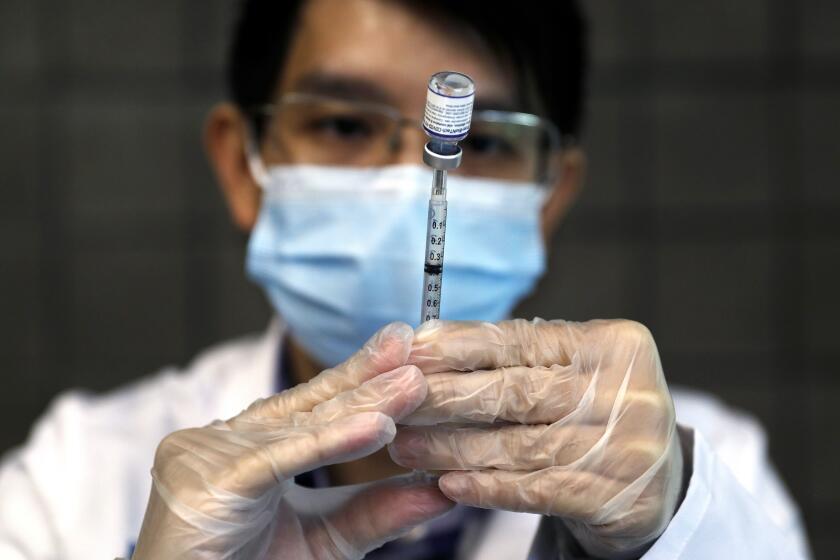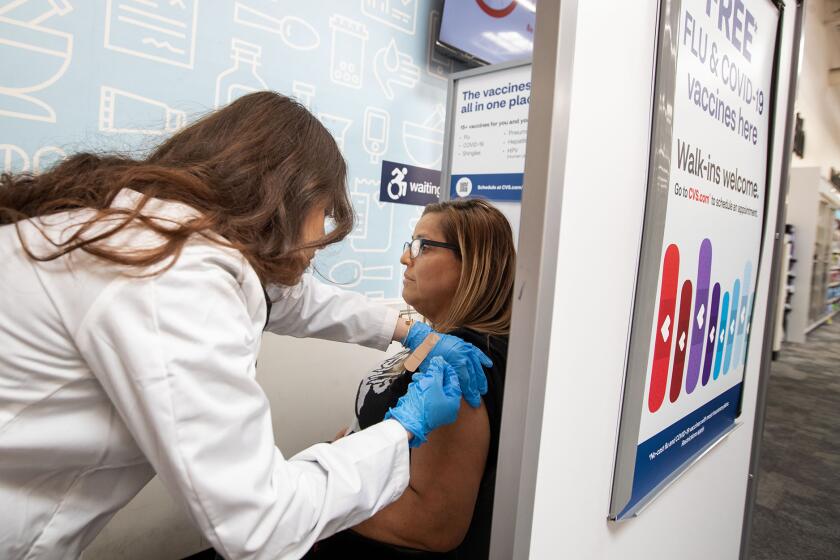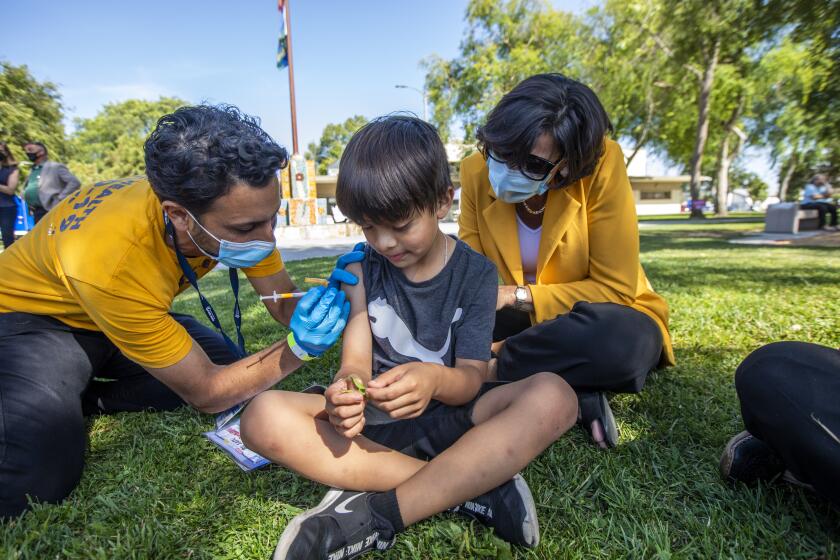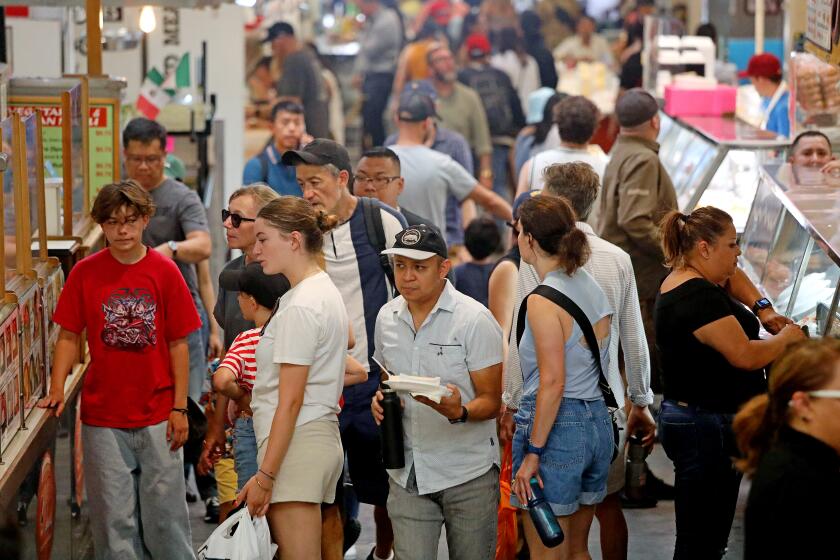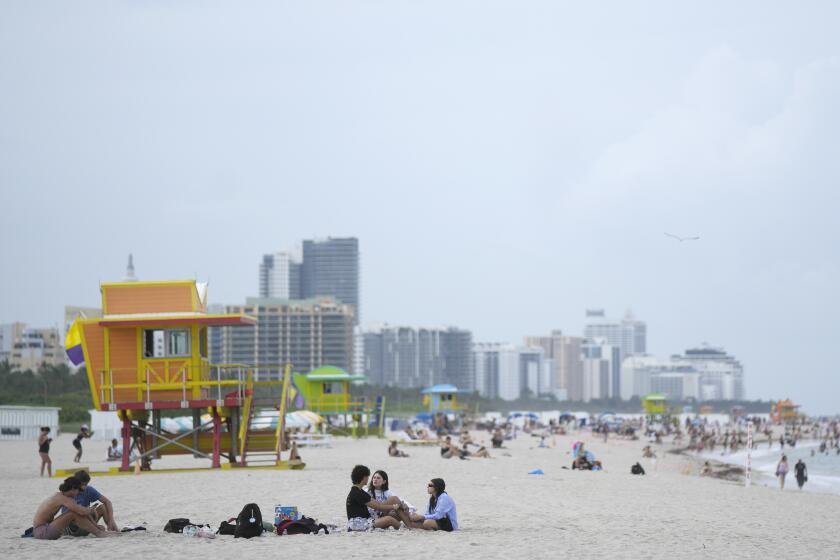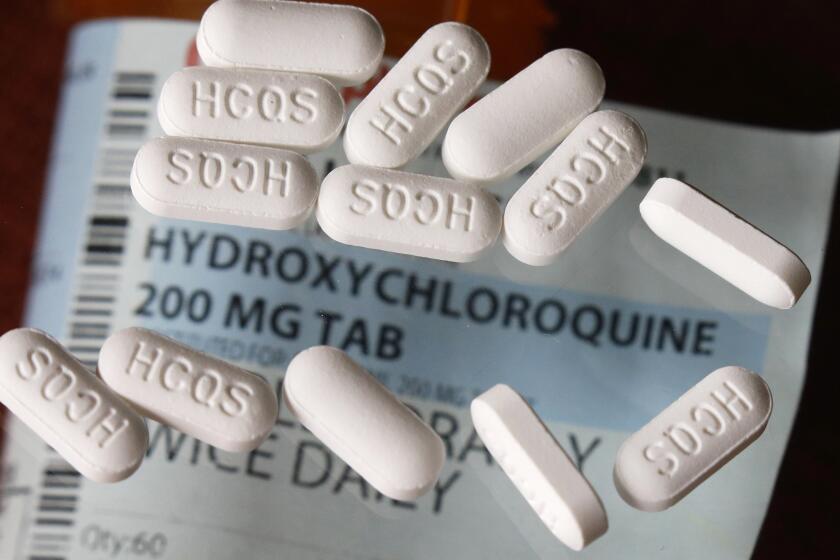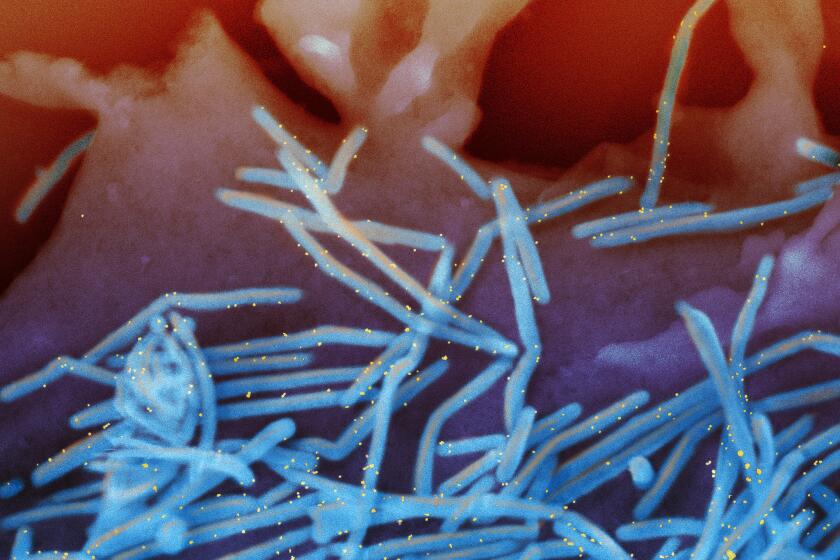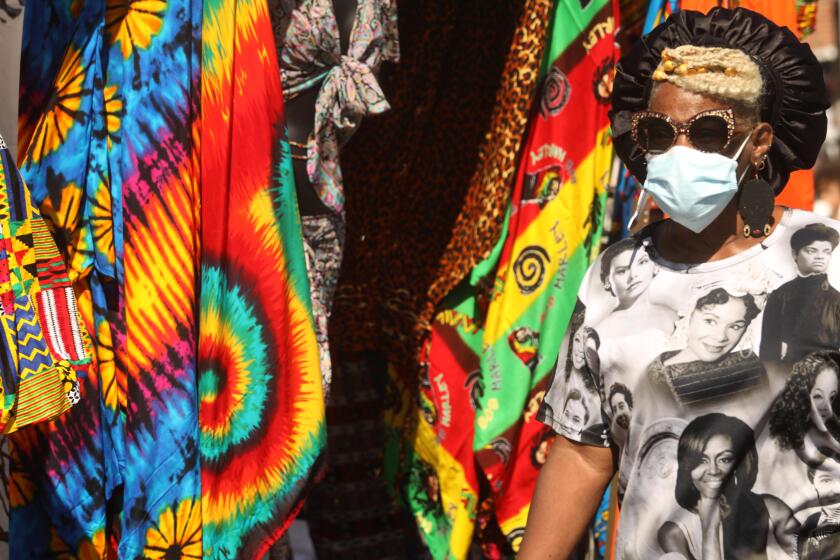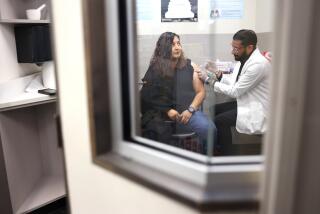When should I get vaccinated for COVID-19? Flu? RSV?
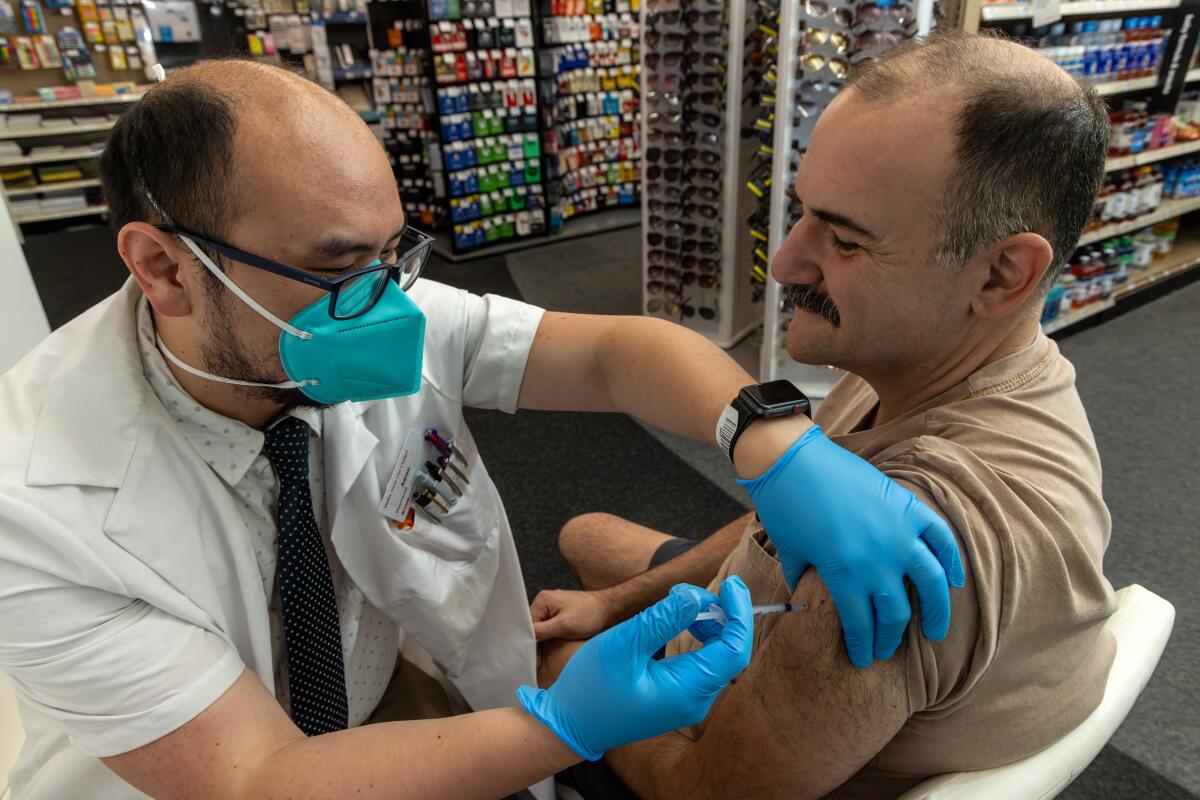
- Share via
A fresh round of flu and COVID-19 vaccines are rolling out to pharmacies, doctor’s offices and clinics across California and the country. But when’s the best time to get your shots?
There are a number of factors that can inform when you roll up your sleeve, officials and experts say. You might consider travel plans, or upcoming holiday gatherings. Maybe you live with someone who has a higher chance of becoming seriously ill from a respiratory infection, or face such risks yourself.
Despite those nuances, one thing health officials agree on: You should get your flu shot and stay current on your COVID-19 vaccines.
A new COVID-19 vaccine is coming, and health officials are recommending most everyone get it. But how many people are willing to roll up their sleeves again?
What vaccines will be available? And when?
Along with the annual batch of flu shots, the U.S. Centers for Disease Control and Prevention now recommends that everyone age 6 months and up get a newly updated COVID-19 vaccination.
Both vaccines are specifically formulated to protect against particular viral strains that officials feel will be prevalent this fall and winter.
“It’s not just a booster. It’s really an updated vaccine,” said Dr. David Bronstein, pediatrician and infectious disease specialist with Kaiser Permanente Southern California, of the new COVID-19 vaccine. “You get your COVID vaccine and you are done, probably for a year, just like with the flu vaccine.”
CVS Health said some of its pharmacies are already administering COVID vaccinations, while Walgreens said appointments might be available as early as this week. It may take another week or two before the COVID-19 vaccine is available at Kaiser and clinics operated by the Los Angeles County Department of Public Health.
Here’s what you need to know about flu shots and when to get them, based on the latest information from the U.S. Centers for Disease Control and Prevention.
What’s the best time to get the COVID-19 and flu shots?
The CDC suggests getting the flu shot sometime in September or October. But even if you miss that window, it’s still important to get it, the agency says.
The CDC doesn’t have a specific recommended timeframe for getting the latest COVID-19 vaccination, but had endorsed the vaccinations for virtually everyone heading into the fall and winter — when coronavirus transmission has typically risen nationwide, as has happened in recent weeks.
“The best time to get any shot is before you’re exposed to the disease,” Bronstein said. “So right now is really the perfect timing to get both.”
In both cases, officials note it takes about two weeks after administration for the vaccines to reach their full potency. So if you’re planning a trip or gathering, you may want to get vaccinated well beforehand to make sure you’re maximally protected.
Bronstein said doctors aren’t seeing a surge in flu yet locally, but “we do expect an early season and a severe season” for flu based off of trends from Australia, where the season was so intense among children some people called it the “kindy flu,” as the flu hit elementary schools, preschools and childcare centers hard.
“Flu is coming and it’s probably going to be early like last year. If you remember last year, it peaked in October, early November-ish, compared to previous years, where you’re typically going to peak sometime after the holidays,” he said.
Dr. Peter Chin-Hong, a UC San Francisco infectious diseases expert, suggests “a good sweet spot” for both vaccinations could be late September or early October.
“But if you might forget, just go ahead and get it now,” he said.
The CDC recommended that much of the American public, everyone age 6 months and up, receive an updated COVID-19 vaccine. The shots could be available this week.
Can I get the flu and COVID-19 shots at the same time?
Yes.
If I just got COVID, should I wait to get the new COVID vaccination?
It’s up to you. The CDC has said that people can either wait three months after recovering from COVID-19 before getting their next vaccination, or they can opt to get it as soon as they have fully recovered.
Los Angeles County officials said they have no plans for new public mask mandates — a sign of how COVID-19 policies have changed in the back-to-normal era.
How much will the COVID shots cost?
Most people will not have to pay for COVID-19 vaccinations, as they will be covered by their health insurance. The federal Vaccines for Children program will provide vaccinations to youngsters at no cost.
For uninsured and underinsured adults, the CDC has a temporary “Bridge Access Program” that will provide vaccinations for free through the end of 2024. Participating providers can be found at vaccines.gov.
I’ve heard there’s an RSV vaccine this year. Can I get it at the same time as the other shots?
A vaccine for respiratory syncytial virus, or RSV, is now available for those age 60 and up. Babies and young children are also eligible to get monoclonal antibodies that can help keep them from falling seriously ill should they get infected.
Between 6,000 and 10,000 older adults die from RSV in a typical year. Among children under 5, the annual death toll usually ranges from 100 to 300.
A Centers for Disease Control and Prevention health advisory notes elevated cases of respiratory syncytial virus in parts of the Southeastern U.S.
Parents should talk to their pediatricians about monoclonal antibodies, which can reduce infants’ risk of RSV-related hospitalization and healthcare visits by 80%. The CDC has recommended a dose of the monoclonal antibodies for infants younger than 8 months who are either born during or entering their first RSV season, which stretches from autumn through the spring.
For children between the ages of 8 and 19 months who are at increased risk of severe RSV disease, such as those who are immunocompromised, the CDC suggests a dose in their second RSV season.
The monoclonal antibody for young children is known by the generic name nirsevimab and the trademarked name Beyfortus, and was developed by AstraZeneca and Sanofi. It’ll be available through healthcare providers.
“This is fantastic ... We’ve been waiting for something like this for a long time,” Bronstein said. The monoclonal antibody “really has been shown to not just decrease doctor’s visits and symptoms of RSV, but more importantly, prevent those hospitalizations that we see year after year.”
When contracting RSV, babies are at risk of having bronchiolitis, in which their small airways narrow, “because of swelling and then you’re wheezing. And it’s very, very hard to manage and some kids have awful complications from it,” he added. Even previously healthy babies and young children with RSV can wind up being hospitalized because they’re struggling to breathe.
Regarding the RSV vaccine for older people, you can get it at the same time as COVID-19 and the flu shots, according to the California Department of Public Health — though some health experts suggest spacing it out a bit.
For people eligible and wanting to get all three vaccines this season, Bronstein said the highest priority would be to get the flu and COVID-19 shots in one visit, and the RSV vaccine later, if you’re able to make a return visit to the doctor’s office or pharmacy. But if you suspect that you won’t return back to get the last shot, it’s also fine to get all three shots in one visit.
The RSV vaccine will be available through healthcare providers and pharmacies.
The law was intended to protect patients from physicians who gave advice they knew to be false or misleading. But many doctors feared it was too vague.
Why did the CDC stop short of recommending the RSV vaccine for all older adults?
The CDC stopped short of recommending the RSV vaccine for all older adults, instead saying they “may receive a single dose of RSV vaccine using shared clinical-decision making. This means that healthcare providers and their patients should have a conversation to determine if RSV vaccination will be beneficial.”
L.A. County Public Health Director Barbara Ferrer said it’s worth talking to your healthcare provider now about whether and when to get the RSV vaccine.
“I think for most people 60 and older, their providers are going to recommend that they get that vaccine,” she said. “Last year, our RSV season started and peaked earlier, as did influenza.”
Those at highest risk for severe RSV disease, and thus most likely to benefit from a vaccine, include people who are moderately or severely immunocompromised or have chronic medical conditions such as diabetes, neurological conditions, heart and lung problems, and disorders of the kidneys, liver or blood. People who live in nursing homes or are otherwise frail are also at higher risk. The risk of severe RSV disease increases with advancing age, the CDC said.
“The goal is what they saw in the studies, which is you can really prevent these lower respiratory tract symptoms — so the coughing, the shortness of breath, more importantly, the wheezing that these older folks see with RSV — that was very, very preventable in the studies and the trials,” Bronstein said.
The U.S. has approved the first vaccine for human respiratory syncytial virus, or RSV, to protect older adults.
There are two vaccines available for RSV for older people, one made by GSK and another from Pfizer.
Data suggest that RSV vaccines are more than 80% effective in preventing RSV-associated lower respiratory tract disease, the CDC said. Of nearly 40,000 clinical trial participants who received either vaccine, six developed inflammatory neurologic events within six weeks of administration, “but it was unclear whether these events were related to [the] RSV vaccination,” the CDC said.
“It’s too small of a number to make an association,” Chin-Hong said. Federal authorities, he added, “wouldn’t have approved it if they didn’t think it was safe.”
Still, it’s reasonable for people who are in their earlier 60s and have no underlying health conditions to consider whether they want to get the RSV vaccination.
“Different people have different risk thresholds,” Chin-Hong said. “If you’re completely healthy as a 65-year-old, you might want to just talk to your provider first.”
In Los Angeles County, the number of new COVID-19 outbreak investigations at work sites tripled in the last month, reaching 73 for the 30-day period that ended Sept. 1.
However, for older people with significant underlying conditions, the benefits would more clearly outweigh the potential risks.
Chin-Hong said he’d have his mom take the RSV vaccination without hesitation, “just because we don’t have any therapies for RSV. So when people who are older who get RSV get sick enough to go to the hospital, we can’t really offer them anything.”
“Personally speaking, if I was over 65, I wouldn’t have any hesitation in taking it,” Chin-Hong said.
Bronstein agreed: “Anyone 60 and up who’s got any of those risk factors, any of those chronic diseases, it’s a great idea for them to be immunized and it looks like a very good vaccine.”
More to Read
Sign up for Essential California
The most important California stories and recommendations in your inbox every morning.
You may occasionally receive promotional content from the Los Angeles Times.
